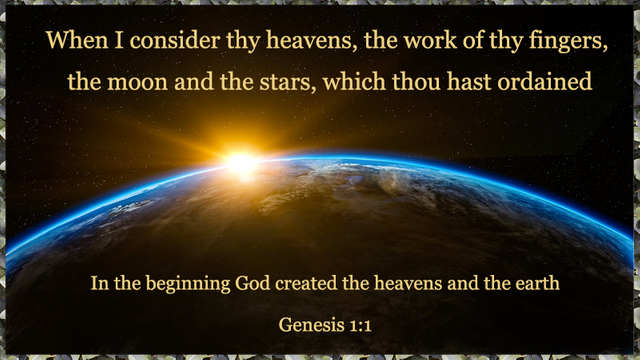
If the foundations be destroyed what can the righteous do?
It is always tempting to attempt to make the Bible fit in with science or man's perceived wisdom, whether it be the latest theory or some well established fact. This a great error.
Rather, we should always start with Scripture as being the absolute norm and then test man's wisdom against what the Word of God tells us. Throughout history men have found that the Word of God is always correct. A new discovery may be made tomorrow which at the outset may seem to contradict Scripture, but eventually it will be seen that the Word of God is proven to be 100% correct.
For example, take the Book of Job which is believed to have been written some 2000 years before Christ. In that book there are numerous scientific facts stated.
In Job chapter 38 verse 16 God asks Job this question:
Have you entered the springs of the sea?
Or have you walked in search of the depths?
Yet it wasn't until 1970s, with the help of deep diving research submarines that were constructed to withstand 6,000 pounds-per-square-inch pressure, that oceanographers discovered springs on the ocean floors!
And so we could go on with many more examples.
As the Psalmist says:
If the foundations be destroyed what can the righteous do?
We need to examine everything through a Biblical lens and always be ready to give an answer for the hope that is within us (1 Peter 3:15). Otherwise our foundations will start to crumble and then where will we be? If the Word of God can be proved unreliable in just one point then what is to say that it is unreliable in every other area?

Yes, the word of God stands trues in all seasons, times and ages!
Downvoting a post can decrease pending rewards and make it less visible. Common reasons:
Submit
If there are many different translations, and the meanings of the original words could be any of various possibilities, then how do we know which is accurate without looking to another source of information for consideration?
For example, Genesis begins with the Hebrew term b'reishit, which in its most literal form means "In beginning". This is an open ended term which could indicate the beginning, or it could indicate a beginning. How can we say which is most accurate from the Bible as the primary source? Countless times this has been translated as "In the beginning", but that does not mean "in beginning" as the more general term is not more accurate. It is a very fine line we walk when logic and reason (where science is a progressive development thereof) are not used to ensure with absoluteness what is truth in its most original form and what is inserted based on interpretation since. Science, flawed as it may be in its current perspectives on reality, is still a very important tool for ascertaining particular details such as this. And this is in the very first words, think how many times these issues arise in the entirety of the text, how many hidden layers of meaning are buried behind misunderstandings and assumptions that have compiled over the years and been inserted into translations, and subsequently been looked at as the Word of God and therefore absolute.
Just my two cents. The Bible is certainly truth, but only when it is interpreted with a framework of understanding of reality can we see that truth in earnest.
Downvoting a post can decrease pending rewards and make it less visible. Common reasons:
Submit